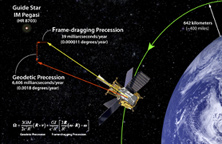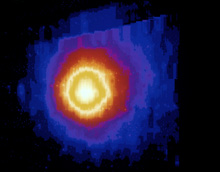- LRK -
----------------------------------------------------------------
http://einstein.stanford.edu/
Final GP-B Experimental Results to be announced in a press and media event at NASA Headquarters.
NASA Headquarters Auditorium
For more details, see our Mission Status Update...
Snip
------------------------------

The geodetic and frame-dragging
measurements and the Schiff Equation
for calculating these relativity effects.------------------------------
http://www.nasa.gov/
As they say on the radio, stay tuned....
snip
------------------------------
Some background information from Wikipedia.
- LRK -
------------------------------
http://en.wikipedia.org/wiki/
[Some info outdated but the media event should bring you up to date. - LRK -]
Gravity Probe B (GP-B) is a satellite-based mission which launched on 20 April 2004 on a Delta II rocket.[3] The spaceflight phase lasted until 2005;[4] its aim is to measure spacetime curvature near Earth, and thereby the stress-energy tensor (which is related to the distribution and the motion of matter in space) in and near Earth. This will provide a test of general relativity, gravitomagnetism and related models. The principal investigator is Francis Everitt.
Initial results confirmed the expected geodetic effect to an accuracy of about 1%. The expected frame-dragging effect was similar in magnitude to the current noise level (the noise being dominated by initially unmodeled effects). Work is continuing to model and account for these sources of unintended signal, thus permitting extraction of the frame-dragging signal if it exists at the expected level. By August 2008 the uncertainty in the frame-dragging signal had been reduced to 15%,[5] and the December 2008 NASA report indicated that the geodetic effect was confirmed to better than 0.5%.[6]
snip
------------------------------
Take note of the amount of time invested in this mission.
I must admit I haven't followed much since I left Ames.
Thanks to Fred for waking me up.
- LRK -
Thanks for looking up with me.
- LRK -
Web Site: http://lkellogg.vttoth.com/
BlogSpot: http://kelloggserialreports.
WordPress: http://lrkellogg.wordpress.
RSS link: http://kelloggserialreports.
Newsletter: https://news.altair.com/
==============================
Final GP-B Experimental Results to be announced in a press and media event at NASA Headquarters.
NASA Headquarters Auditorium
300 E. Street SW
Washington, DC 20546-0001
Date: Wednesday, May 4, 2011
Time: 1:00-2:00 pm EDT
For more details, see our Mission Status Update...Snip
------------------------------

The geodetic and frame-dragging
measurements and the Schiff Equation
for calculating these relativity effects.
------------------------------
http://einstein.stanford.edu/
Press and Media Event at NASA Headquarters
After 34 years of research and development, 10 years of flight preparation, a 1.5 year flight mission and 5 years of data analysis, our GP-B team has arrrived at the final experimental results for this landmark test of Einstein’s 1916 general theory of relativitysnip
NASA TV and Webcast Coverage
This GP-B press and media event will be carried live on NASA TV, and on the NASA TV website at:http://www.nasa.gov/
Final Results to be Posted on this Web Page
Following the NASA press and media event next Wednesday, we will post a summary of the final results on this web page, including a link to a results summary paper recently accepted for publication in the journal Physical Review Letters.As they say on the radio, stay tuned....
snip
------------------------------
Some background information from Wikipedia.
- LRK -
------------------------------
http://en.wikipedia.org/wiki/
[Some info outdated but the media event should bring you up to date. - LRK -]
Gravity Probe B (GP-B) is a satellite-based mission which launched on 20 April 2004 on a Delta II rocket.[3] The spaceflight phase lasted until 2005;[4] its aim is to measure spacetime curvature near Earth, and thereby the stress-energy tensor (which is related to the distribution and the motion of matter in space) in and near Earth. This will provide a test of general relativity, gravitomagnetism and related models. The principal investigator is Francis Everitt.
Initial results confirmed the expected geodetic effect to an accuracy of about 1%. The expected frame-dragging effect was similar in magnitude to the current noise level (the noise being dominated by initially unmodeled effects). Work is continuing to model and account for these sources of unintended signal, thus permitting extraction of the frame-dragging signal if it exists at the expected level. By August 2008 the uncertainty in the frame-dragging signal had been reduced to 15%,[5] and the December 2008 NASA report indicated that the geodetic effect was confirmed to better than 0.5%.[6]
snip
------------------------------
Take note of the amount of time invested in this mission.
I must admit I haven't followed much since I left Ames.
Thanks to Fred for waking me up.
- LRK -
Thanks for looking up with me.
- LRK -
Web Site: http://lkellogg.vttoth.com/
BlogSpot: http://kelloggserialreports.
WordPress: http://lrkellogg.wordpress.
RSS link: http://kelloggserialreports.
Newsletter: https://news.altair.com/
==============================
http://www.nasa.gov/mission_
Gravity Probe B was a mission designed to test two predictions of Einstein's general theory of relativity. It completed its data collection operations and was decommissioned in Dec. 2010. The experiment used four ultra-precise gyroscopes to measure the geodetic effect, which is the warping of space and time by a celestial body like Earth, and frame-dragging, which is the amount a spinning object like Earth pulls space and time with it as it rotates.
Developed by NASA and Stanford University in Palo Alto, Calif., the spacecraft was launched on April 20, 2004, from Vandenberg Air Force Base in Calif. Gravity Probe B spent 17 months collecting data while in orbit around the Earth. Unlike most NASA science missions that seek to make new observational discoveries, Gravity Probe B was conducted to verify fundamental assumptions in physics, which have implications for all of space exploration.
snip
==============================
http://spectrum.ieee.org/
The Gravity Probe B Bailout
Perhaps the most sophisticated satellite ever flown was nearly doomed by a tiny error, and NASA planned to end the experiment. But with a little creative fund-raising, the project may have bought enough time to prove its worth By Paul S. Wesson, Mark Anderson / October 2008
In 1964, before the term ”black hole” was even coined, NASA began funding a project that would test the outer limits of the theory behind black holes, Einstein’s general theory of relativity. Last May, with the project, called Gravity Probe B (GP-B), looking like a US $650-million flop, a NASA review board recommended that all funding be cut off by the end of September.
Now, in a dramatic turnaround, the Gravity Probe B team has secured non-NASA funding to press forward with data analysis of an experiment that has been bogged down by unexpected sources of noise. With the latest round of stopgap funds in place, the group holds out hope that it will either be able to verify or refute one of the most extreme predictions of Einstein’s general theory of relativity.
snip
==============================
WHAT THE MIND CAN CONCEIVE, AND BELIEVE, IT WILL ACHIEVE - LRK
==============================
Gravity Probe B was a mission designed to test two predictions of Einstein's general theory of relativity. It completed its data collection operations and was decommissioned in Dec. 2010. The experiment used four ultra-precise gyroscopes to measure the geodetic effect, which is the warping of space and time by a celestial body like Earth, and frame-dragging, which is the amount a spinning object like Earth pulls space and time with it as it rotates.
Developed by NASA and Stanford University in Palo Alto, Calif., the spacecraft was launched on April 20, 2004, from Vandenberg Air Force Base in Calif. Gravity Probe B spent 17 months collecting data while in orbit around the Earth. Unlike most NASA science missions that seek to make new observational discoveries, Gravity Probe B was conducted to verify fundamental assumptions in physics, which have implications for all of space exploration.
snip
==============================
http://spectrum.ieee.org/
The Gravity Probe B Bailout
Perhaps the most sophisticated satellite ever flown was nearly doomed by a tiny error, and NASA planned to end the experiment. But with a little creative fund-raising, the project may have bought enough time to prove its worth By Paul S. Wesson, Mark Anderson / October 2008
In 1964, before the term ”black hole” was even coined, NASA began funding a project that would test the outer limits of the theory behind black holes, Einstein’s general theory of relativity. Last May, with the project, called Gravity Probe B (GP-B), looking like a US $650-million flop, a NASA review board recommended that all funding be cut off by the end of September.
Now, in a dramatic turnaround, the Gravity Probe B team has secured non-NASA funding to press forward with data analysis of an experiment that has been bogged down by unexpected sources of noise. With the latest round of stopgap funds in place, the group holds out hope that it will either be able to verify or refute one of the most extreme predictions of Einstein’s general theory of relativity.
snip
==============================
WHAT THE MIND CAN CONCEIVE, AND BELIEVE, IT WILL ACHIEVE - LRK
==============================





No comments:
Post a Comment
Note: Only a member of this blog may post a comment.